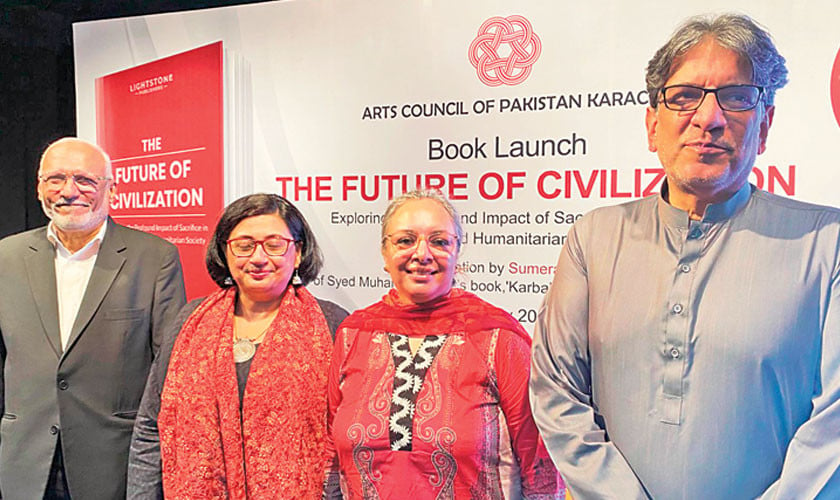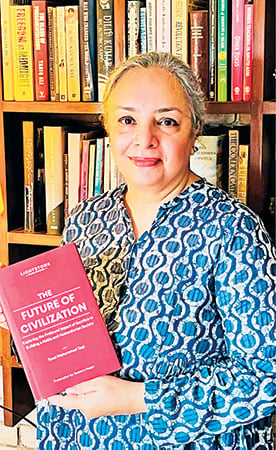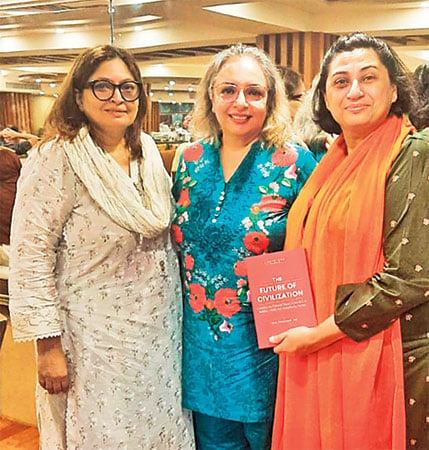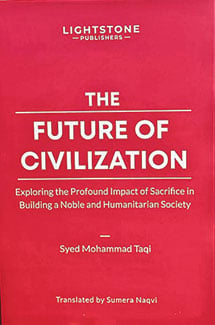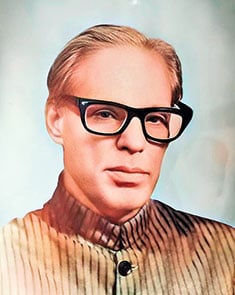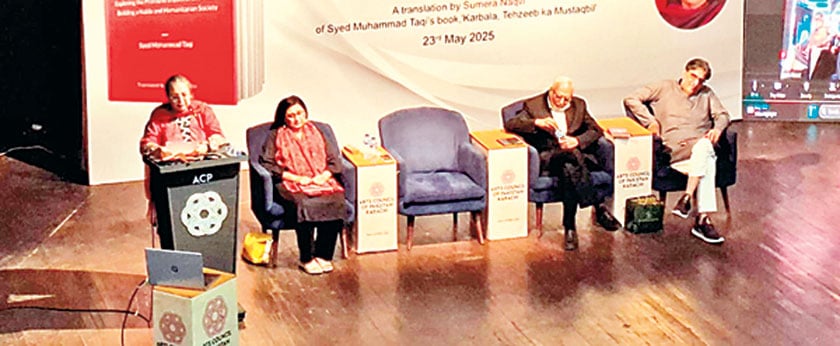Sumera Naqvi has extensive experience in media and communications, with over 35 years of impactful expertise in journalism, communications, and advocacy. Armed with a Master’s degree in Mass Communications from Karachi University, she began her career with The News International in 1991 as a member of its launch team. In 1994, she joined Dawn News, where she worked for almost 20 years, contributing feature articles, investigative reports, columns, books, and theatre reviews. In 2014, she decided to shift her focus to the development sector and joined a non-profit organisation dedicated to mental health and rehabilitation. She has also worked as consultant for low-budget non-profits, providing them structural and communications support, as well as assisting with corporate compliance.
Naqvi has recently come up with her maiden book ‘The Future of Civilization’, a translation of Syed Mohammad Taqi’s book, ‘Karbala, Tehzeeb ka Mustaqbil’. According to her, this book is a labour of love. In an exclusive interview with You! Magazine Naqvi shares her thoughts with our readers…
You! Tell us a bit about your early life…
Sumera Naqvi: I grew up in a family that valued books and knowledge, in an environment that encouraged tolerant and civilised discussions on sensitive societal and political issues. Both of my parents were authors, and they often took me to places where such discussions took place; they also organised them at home. One memorable event I attended was a mushaaira where the fiery poet Habib Jalib recited his poem, Dastoor.
Art, music, and culture were very close to my parents’ hearts. Their inspiration for fostering open discussions about art and culture stemmed from my grandfather, Syed Muhammad Taqi, whose house in Garden East, a central area in Karachi, became a gathering place for people of all ages – politicians, poets, writers, and thinkers.
I inherited my interest in journalism from my grandfather, who served as the editor of Daily Jang for 25 years. My father was a strong advocate for public service, which ultimately led me to work in the development sector.
You! What inspired you to translate Syed Mohammad Taqi’s book – Karbala, Tehzeeb ka Mustaqbil?
SN: More than just feeling inspired, I believed it was my duty as a member of such an illustrious family to carry on the legacy. Rais Amrohvi and Jaun Elia were the brothers of Taqi Sahab. My father, Syed Mumtaz Saeed, was considered the management guru of Pakistan.
The book ‘Karbala, Tehzeeb ka Mustaqbil’ had gained significant popularity among Urdu readers. I had previously read the original manuscript in Urdu, but it never occurred to me to translate it until I was approached for the task.
My mother had also been looking for someone to translate Taqi Sahab’s major works, such as Rooh aur Falsafa, Mantiq, Falsafa aur Science, and Tareekh aur Kaainat- Mera Nazariya, into English. At that time, I didn’t consider myself capable of translating these highly intellectual works on philosophy.
However, as I began re-reading Karbala, Tehzeeb ka Mustaqbil for the translation, I was struck by the novel and compelling arguments Taqi Sahab presented about the profound impact of monumental sacrifices in history made for one’s principles. The tragedy of Karbala and the noble sacrifice of Imam Hussain(AS) and his family serve as a poignant exemplar for standing firm in one’s principles and the Islamic ideal. I felt it was essential to translate these insights into English for a broader audience.
You! What is the book all about?
SN: Syed Muhammad Taqi examines the profound impact that the virtue of sacrifice has on the application and implications of civilizational, moral, and ethical values. In his work, he challenges readers to think critically and bases his arguments on the crucial need for positive resources and methods to achieve beneficial and far-reaching outcomes. If these goals aren’t met, the significance of sacrificing for a cause, especially a humanitarian one, remains short-term.
Taqi reveres three monumental sacrifices in history: those of Socrates, Hazrat Eesa(AS), and Imam Hussain(AS). These sacrifices not only altered the course of history but also profoundly influenced humanity, guiding individuals to choose honest and positive means to achieve their objectives. He explains the background and circumstances under which Imam Hussain(AS) sacrificed his life and draws parallels among the three sacrifices, arguing that Imam Hussain’s(AS) sacrifice holds a higher significance. Additionally, he mentions important factors that are instrumental in building a civilised and humanitarian society.
You! How long did it take you to finish your first book?
SN: I started working on translating the book in 2020. Those were the COVID years, and I was confined to my home. I used to start out early in the day with a fresh mind to comprehend the text.
I completed the first draft of the book in two years. I held revisions at least 10 times, revisiting the arguments made by Taqi Sahab in the Urdu version to ensure I understood them correctly. In 2024, my cousin sent the manuscript to Ameena Saiyid who, after having it read, decided to publish it. The rest is history.
You! How have the readers received your work so far?
SN: I received tremendous response which, honestly, I was not expecting. The book’s first edition sold out in a matter of days. I received encouraging remarks from literary icons such as Dr Azra Raza, Iftikhar Arif Saab, Dr Noman ul Haq, Mr Wasif Rizvi, and Mr Abbas Husain.
You! Translating a book from one language to another is a gigantic task. How was your journey?
SN: Indeed, it is. Translation is also a huge responsibility. The journey of translating ‘Karbala, Tehzeeb ka Mustaqbil’ was a challenging endeavour. The primary challenge arose from the brilliance of Syed Muhammad Taqi, a genius philosopher who employed his deep analytical skills and logic to present his arguments. While reading the book, one can observe how skillfully he utilises the Socratic Method – asking questions and revisiting his arguments to emphasise his points. It feels as if one is in a courtroom, listening to arguments from both sides to help reach a conclusion. Another challenge was the complexity of the vocabulary in the original Urdu version. I discovered many new Urdu words during the translation process.
A third challenge was Taqi’s numerous references that necessitate extensive research. For example, he elaborated on the difference between de facto and de jure when describing Imam Hussain’s(AS) refusal to take the oath of allegiance. He mentioned Herodotus and Sartre to strengthen his viewpoints. My goal was to make this book an easy read, while preserving the author’s original flow of thought and retaining his character in the translation.
You! What is your favourite subject which is close to your heart?
SN: I consider myself a storyteller, crafting narratives on a variety of subjects. However, social issues, reforms, and the arts – especially theatre – are topics that are particularly dear to me. I have written extensively about social issues, and some of my work has attracted the attention of the legal community, resulting in suo motu notices being taken against certain matters. Additionally, I enjoy writing about parenting and its challenges.
You! What are your five favourite books?
SN: I am not sure if I can pinpoint five books, but I can certainly count some of my favourite authors: Elif Shafak tops the list, followed by Arundhati Roy, Jhumpa Lahiri, and Tennessee Williams, the playwright. One book that I loved reading was Lesley Hazelton’s ‘After the Prophet’. Her writing style is most engaging. ‘Clash of Civilizations’ by Samuel Huntington is also a favourite. In Urdu prose, Masood Ashar was one of my favourite short story writers.
I also thoroughly enjoy reading Syed Muhammad Taqi’s prose.
You! Are people still interested in reading and buying books in today’s techno world?
SN: Fortunately, there still is a dedicated segment of the population that values and seeks out literature. However, there remains a pressing need for authors to receive fair royalties for their work. Unfortunately, the structure of the book publishing industry in Pakistan doesn’t provide authors with the same benefits as those in the West. I remember when my father published his book, ‘Managerial Challenge in the Third World’, in the US through Praeger Publishers. He would receive royalty cheques every time copies of his book were sold.
As a family of authors whose books were locally published, we can’t help but feel dissatisfied with the current state. Whether books are sold online or in bookstores, it’s crucial that a system is established to ensure that authors benefit from their hard work. This would not only honour their contributions but also encourage more writers to share their stories and ideas.
You! What is the most important advice you can give to women?
SN: We generally live in an environment of fear, and women are conditioned from a very tender age to internalise fear as a normal emotion. Thus, they lack the confidence to encounter fear at times of personal danger. They fail to defend themselves and fall into the trap.
My advice to women is to focus on honing their skills and strengths, and then forge ahead with their passions. Women must be financially empowered and problem-solvers.
You! Could you name a woman who’s inspired you the most?
SN: One of the greatest influences in my life is my mother, Shaista Saeed. She’s always been a go-getter, someone who always looks at the brighter side of life, and offers advice that puts you in a positive mood.
You! Are there any lessons learnt the hard way?
SN: One should walk away from toxicity because it simply isn’t worth it. Whether it’s at work, at home, in a store, or around certain individuals, one shouldn’t let trivial or mundane issues affect their goodness.
You! What did you like to read when you were a little girl?
SN: Enid Blyton was my favourite author, and my second favourite was the stories of Winnie the Pooh; I particularly liked the character itself. My father would often take me to the bookstore to choose new books to read. After I finished reading, we would discuss the stories together. Our dinner table conversations revolved around what the story was about, what I liked, and what I didn’t like – a great way to develop my analytical skills.
You! What are some of your favourite ways to relax and have fun?
SN: One of my most relaxing moments is spending time with my triplet children, who are now all grown up. When they were little, I cherished the time I had with them after work, listening to their stories about their experiences in school, college, and finally university. I still enjoy listening to their stories and also to their fresh and different perspectives. Since my husband and I are food enthusiasts, we also enjoy trying out new kinds of food. I also enjoy meeting friends. I am fortunate to have wonderful friends around me, so we often make plans to meet, laugh, and share good times together.
You! How do you keep a balance between family life and work?
SN: I have always believed that good communication was essential to keep my children’s queries answered and their emotional needs met. If I had to stay late at the office, go on an official trip, or attend a late meeting, I would call them to explain why I was late and let them know when I would be home. I made it a point to reach home around the time I promised. They were understanding and grew proud of me. Additionally, personal care and mental well-being is very important to keep a happy balance. I enjoy swimming and attending yoga sessions in my free time. That’s what I call my ‘me time’.
You! What’s next on your agenda? Are you considering writing an original novel or book?
SN: I will be publishing my journalistic articles soon. There are some translation projects in hand that I am working on. And soon, I will be writing about my experiences as a working mother who raised triplet daughters in a typical Pakistani society.
